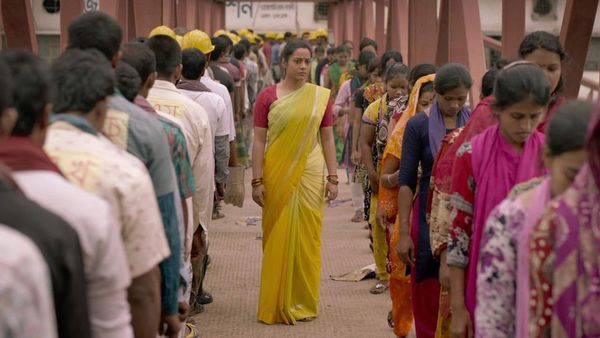Eye For Film >> Movies >> Under Construction (2015) Film Review
Under Construction
Reviewed by: Amber Wilkinson

The age-old problems of the partriarchy and wide divisions in social class are examined in Rubaiyat Hossain's Under Construction, this time against the backdrop of urban Bangladesh. On the surface Roya (Shahana Goswami) seems to have a perfectly built life, with a long-standing acting career, businessman husband and sleek apartment equipped with a maid, Moyna (Rikita Nandini Shimu).
But, Hossain's film asks, who exactly has built this? Roya may have helped lay a few bricks but her place in society seems mostly carved out for her, with even her theatre role - Nandini in Tagore's anti-captialist drama Red Oleander - remaining the same for 12 years. Her marriage, too, is less than content, with a baby 'expected' by both her husband (Shahadat Hossai) and mother (Mita Chowdhury), even as Roya starts to consider creating a quite different 'child' of her own.

All the women in Hossain's film have strong viewpoints. Moyna is ready to embrace the role of working wife and mother, even if it means living in dire circumstances, while Roya's mother, having been left by her father, has found a new 'patriarch' in religion, allowing its fundamentalism to dictate her life. The subtle control of men is also exhibited by Roya's husband who, although seeming to be 'modern' on the surface, still exhibits a deep well of passive aggression and emotional manipulation in order to control his wife.
Hossain is no stranger to controversy, with her debut Meherjaan – about a love affair between a Bangladeshi woman and a Pakistani soldier during the 1971 war of independence – pulled from cinemas after a week due to a public outcry. Under Construction is also challenging to masculine dominance in its portrayal of women, as Hossain allows Roya to embrace her freedom, showing intimate details of an affair that is allowed to have a much more positive impact on her life than is more often the case on film.
The director also employs dream sequences effectively, to unsettle the atmosphere and suggest Roya's psychological turmoil. While some of the scripting tends towards the melodramatic, Hossain offsets this by giving her film a strong sense of place. The city of Dacca is undergoing rapid change and not everything that is being built is structurally sound - particularly buildings in the sweatshop garment district where Moyna finds herself working. Hossain takes on a lot here in terms of allegory and some of her ideas nudge at the boundaries of believability but she nevertheless remains true to her construct and feminist argument, leaving us to decide what the future holds for the reinvented Roya and, by implication, many women struggling to redefine themselves in non-traditional roles.
Reviewed on: 03 Jan 2017















